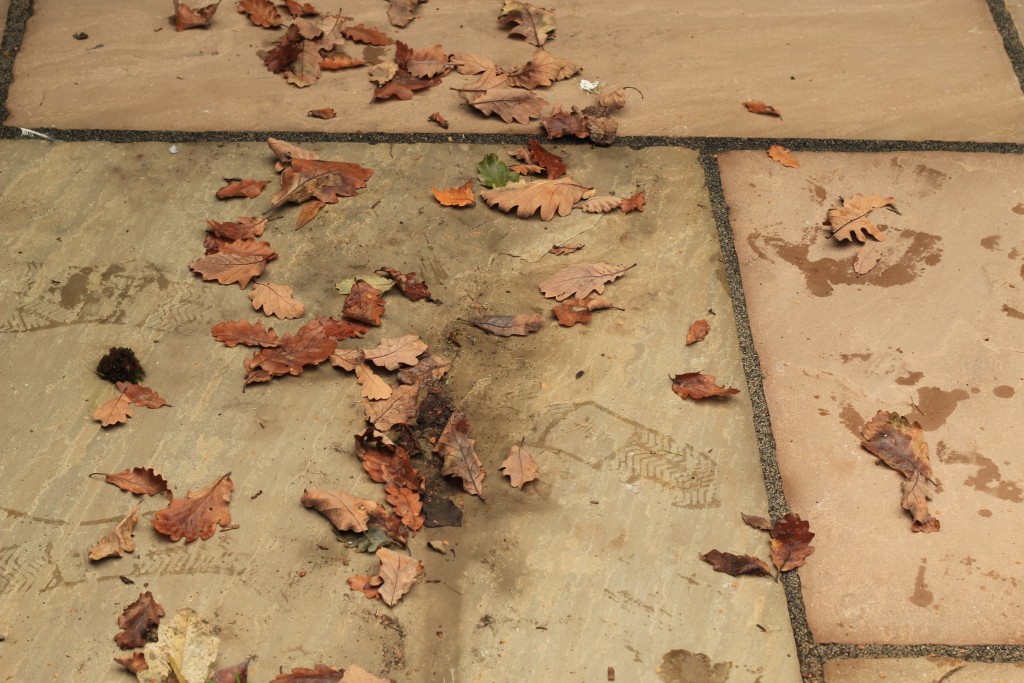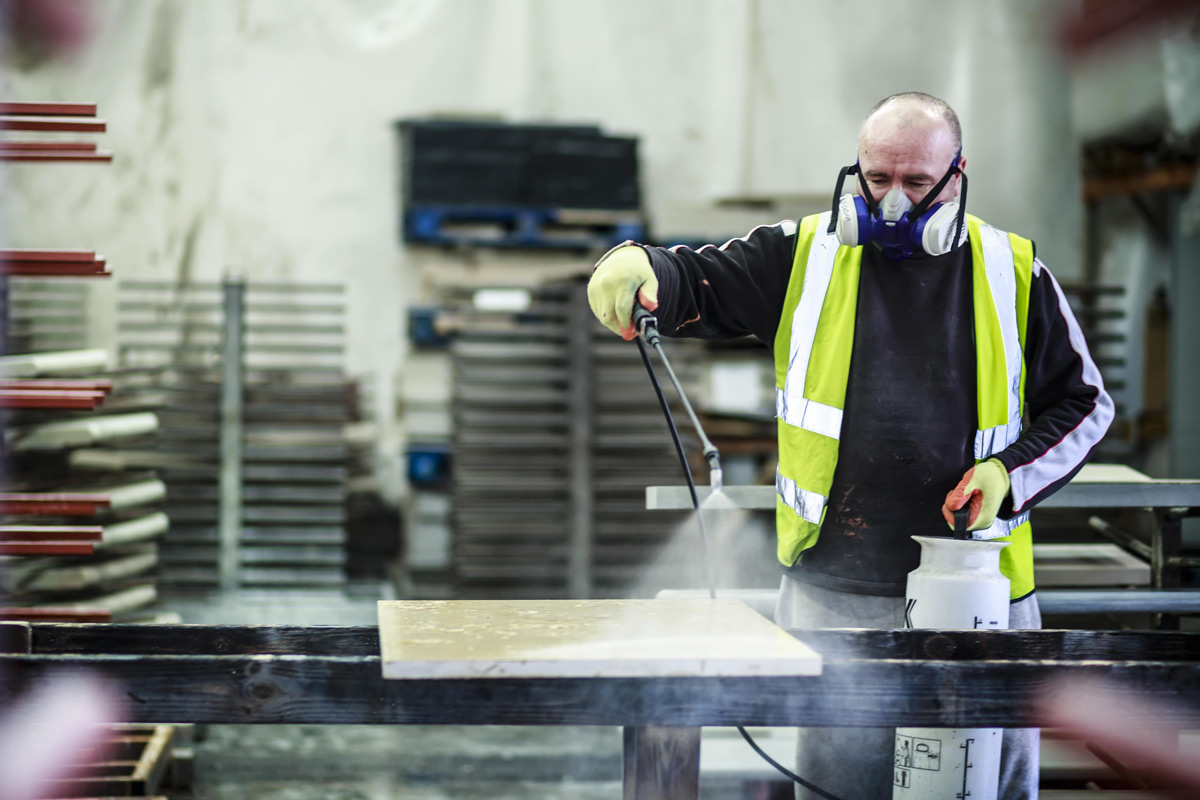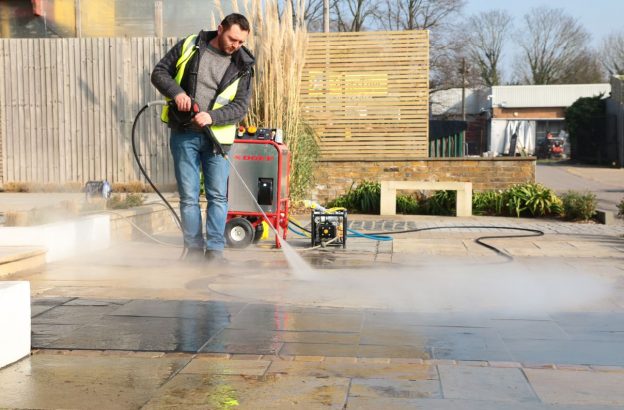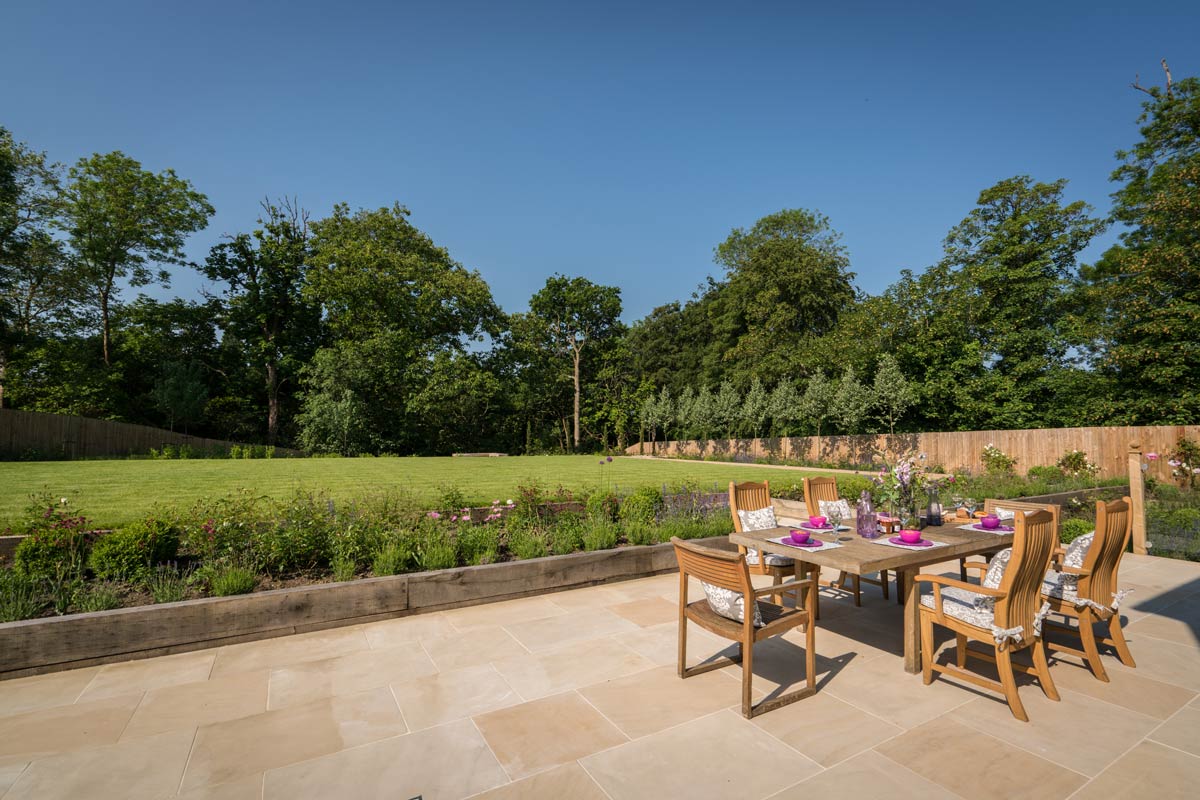Got a difficult stain on your paving? Unsure which is the best patio cleaner for your needs? We take you through the various options.
One of the important elements in how to clean a natural stone patio is choosing the right cleaner when you need to. It's a good idea to apply a general cleaner in spring and/or autumn. Below we explain the options, as well as the specialist solutions you might need from time to time.
Patio Cleaners for General Maintenance
The choice can be bewildering, and there is plenty of advice online that suggests using brick acid to clean a patio, which can result in disaster. If you're at all confused about what patio cleaner to use, we're happy to advise.
Lithofin MN Outdoor Cleaner
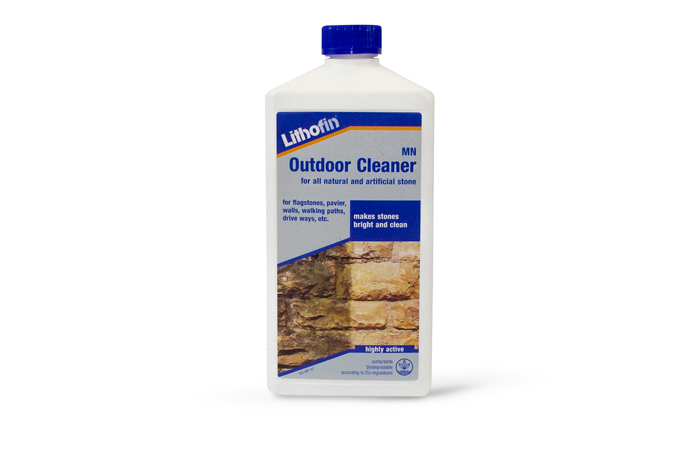
This highly active cleaner, with chlorine and special additives is likely to be all you need when giving a patio a thorough clean.
A special product for natural stone and porcelain, including limestone, it’s a highly active cleaner based on chlorine compounds and special additives. It works fast and thoroughly and we particularly recommend it for natural vegetation, leaf marks, mould, and where leaves have mulched onto the surface. We've found it quite magical in the results it gives.
Ideally, use Outdoor Cleaner once a year to get a really thorough deep clean. This should take you through to the autumn when a re-application of Algex will protect your patio from the worst of the winter. The only caveat we need to offer is that Outdoor Cleaner shouldn't be used on stone which has been sealed with Dry Treat Intensifia, as it can sometimes lead to bleaching.
Coverage: 5-10m2 per litre
Method: Low pressure spray
There are a couple of caveats that we've found in our experience. Outdoor Cleaner shouldn't be used on stone which has been sealed with Dry Treat Intensifia, as it can sometimes lead to bleaching. And, although it can be used on limestone, our experience is that, used neat, there is a danger of bleaching the stone. So we recommend diluting it with water.
We recommend following Outdoor Cleaner with Lithofin Algex to slow algal growth.
Dry Treat Alkaline Cleaner
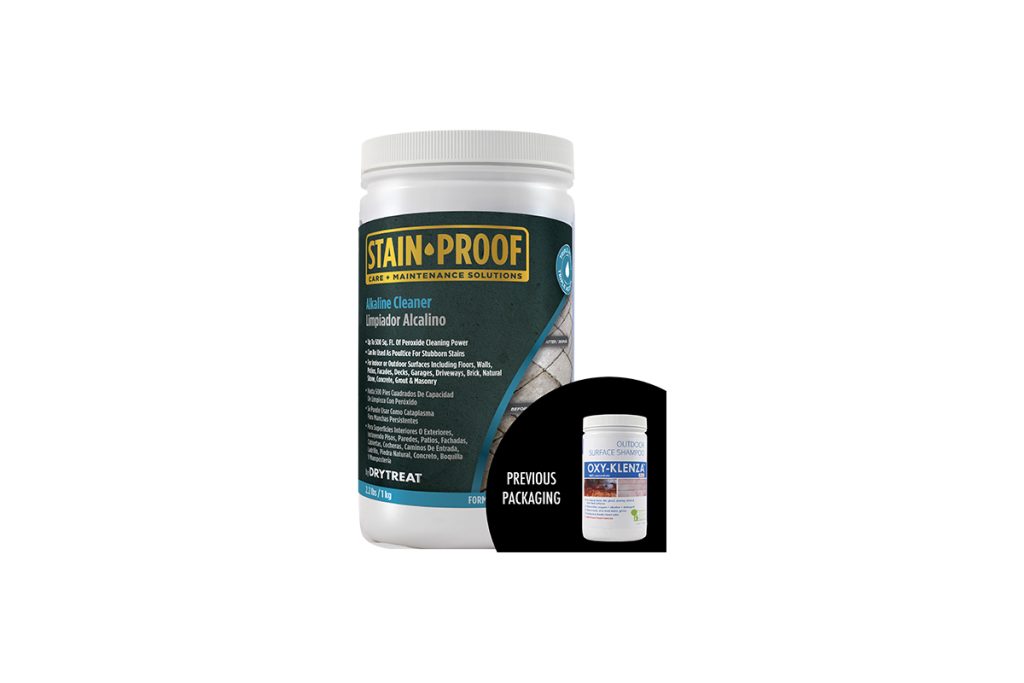
Dry Treat Alkaline Cleaner, previously known as Hanafinn Oxy-Klenza, does very much the same job as Outdoor Cleaner, but is the product of choice for stains resulting from food spills, drinks (the dreaded red wine spill!), oil, and anything that contains grease - even old, dried-in stains.
A combination of oxygen, alkaline and detergent, it pulls different stains out of stone, depending on the concentration used. An odourless, powerful triple action, oxygen-, alkaline- and detergent-boosted heavy-duty cleaner, it can be used for patios, building facades, decks, cladding, garages, driveways, eating and entertaining areas and is safe for all natural stone—including limestone—as well as tiles, masonry, concrete, brick and grout.
A powder that you mix into water, this can also be used as a poultice, applied to a stain and covered in cling film, allowing it to draw out a stain over an extended period.
We recommend using this as a first port of call for removing mortar stains.
Coverage: Depends on dilution, but one 2.2lb tub can clean up to 46m2.
Application: Direct
Dry Treat SMC Peroxide Cleaner
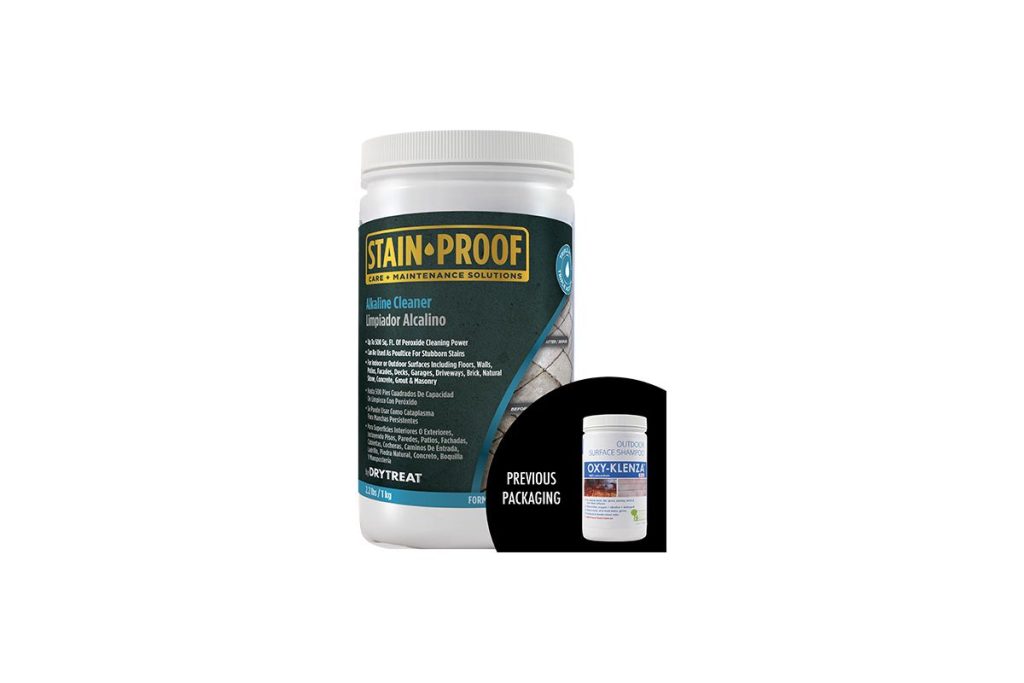
Dry Treat SMC Peroxide Cleaner, previously known as S-Tech Stone & Masonry Cleaner is a unique, ready-to-use hydrogen peroxide based cleaner, used to give paving a good general clean. It's specifically designed for cleaning stubborn organic stains and deeply embedded dirt on porous stone and masonry. This product fizzes as it reacts on dirt, which makes it easy to use. It's also pH-friendly.
Coverage: 20m2per litre
Application: External/internal
Method: Low pressure spray/watering can
Lithofin MN Power-Clean
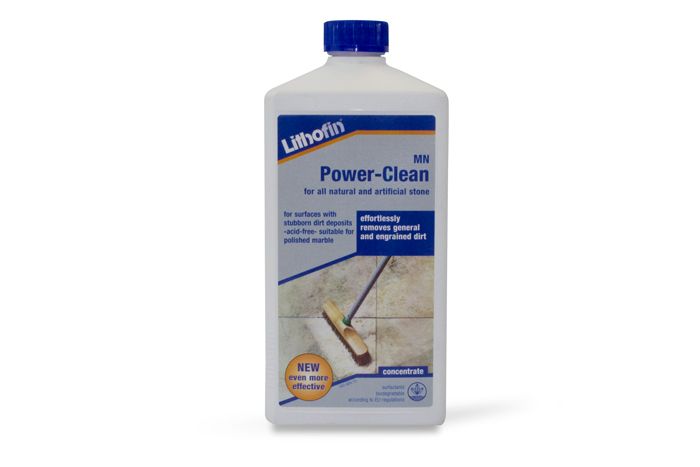
Free from solvents and nearly odourless, Lithofin MN Power-Clean is a good choice for cleaning indoor natural stone and porcelain tiles, so may be preferred if you have an Indoor Outdoor living space. It will remove floor polish residues and care products and, being mildly alkaline, can also be used on limestone and marble.
Coverage: undiluted, 5-10m2, depending on dirt; diluted, up to 30m2.
Method: direct
Removing algae from paving
Lithofin Algex
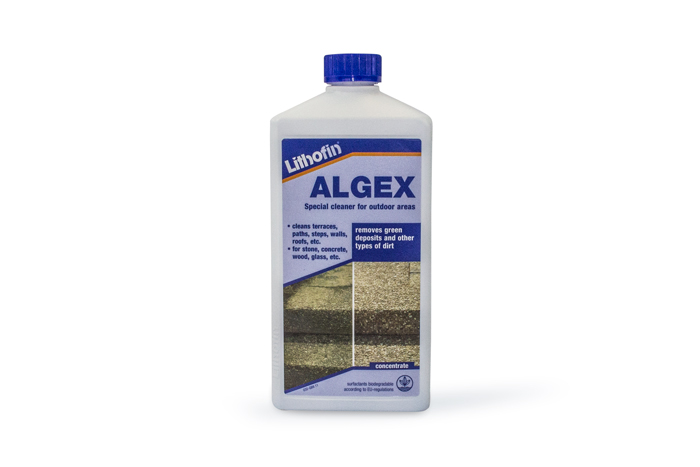
Lithofin Algex is a maintenance product that we recommend using annually in autumn. Use it after cleaning with Lithofin Outdoor Cleaner and if you have algae growing on your paving. What we like about it is that it stays on the stone, almost as a barrier, and every time it rains, it dilutes again and penetrates the stone a little more, which means it continues to work at reducing the algae's ability to get a foothold over the winter season.
Coverage: 20-50m2 with a watering can; up to 200m2 with a low-pressure sprayer. A sprayer is preferable, to allow for better coverage and penetration.
Application: Watering can/low-pressure spray Apply Algex to clean stone after it's been thoroughly swept with water or jet washed. Cleaning your patio in autumn and limiting algal growth means that there's less to do the following spring.
Find more information on Algex in how to prevent your patio from turning green.
Removing rust marks from paving
Lithofin Bero
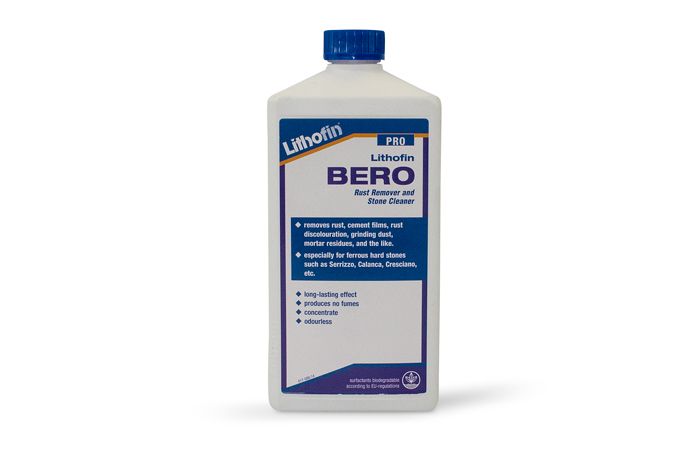
Lithofin Bero isn't a cleaner you'll need unless you encounter naturally occurring rust. This is a natural phenomenon. Natural stone often contains traces of iron and these may oxidise, as a result of wet weather or cleaning, into orangey-brown marks.
Bero chemically changes the rust particles in the stone, so removing the marks and keeping further occurrences under control. It also removes cement residues and similar dirt.
When you use Bero you should always treat the entire paved area. This is because occasionally it may make paving darker. This effect will wear off with time.
Coverage: 10m2 per litre
Application: Low pressure spray
PLEASE NOTE: Lithofin Bero should never be used on calcareous stone such as limestone or marble. However, it is suitable for all acid-resistant natural stone, porcelain and brick.
Lithofin Rust-Ex
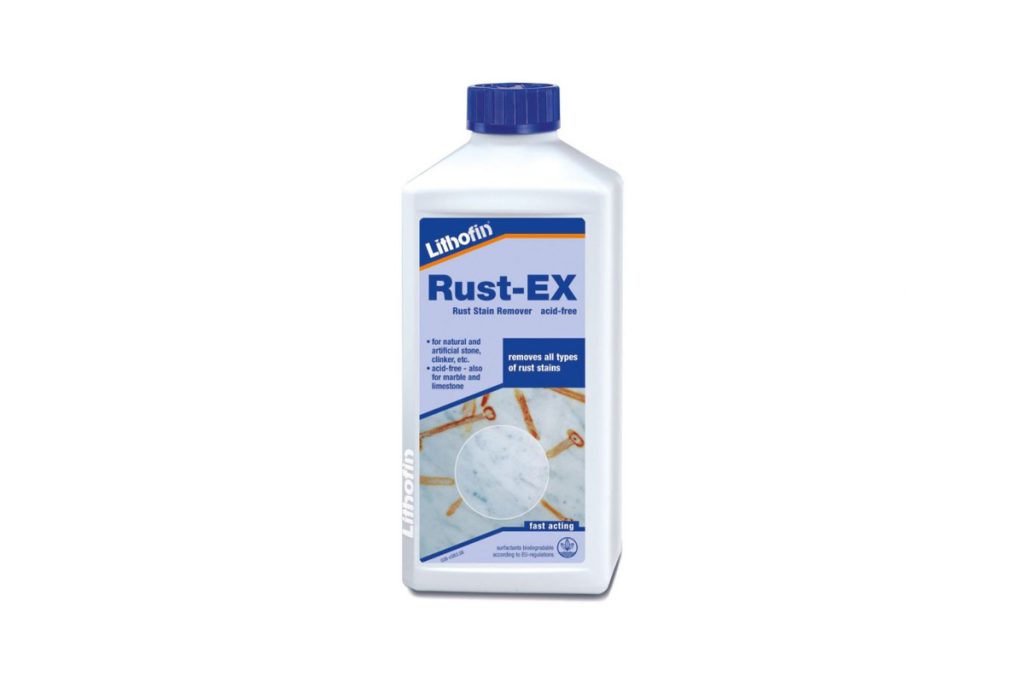
Lithofin Rust-Ex also removes rust marks. It costs more than Bero, but its advantages are that it doesn’t affect the colour of paving, is faster to use (applied to the stone for a maximum of 10 minutes, as opposed to 4-8 hours) and can be used for spot cleaning. You know it’s working, as it turns purple in reaction to rust.
It is also suitable for limestone and other calcareous materials.
We recommend this for removing isolated stains caused by metal garden furniture or pots, fertilizers that contain iron, etc.
Coverage: Up to 10m2/l
Method: Direct application via brush
Removing cement from paving
Lithofin Builders’ Clean
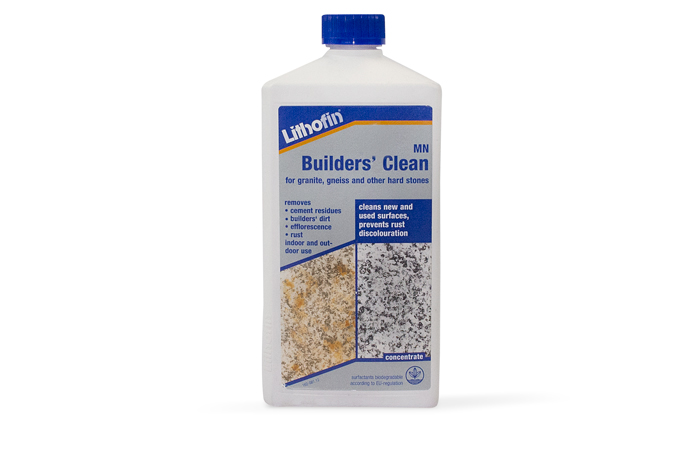
Lithofin Builders' Clean can be used for light rust discolouration, as well as efflorescence, limescale deposits, and ingrained dirt. However, it's more squarely aimed at cementitious residues where, for example, pointing has spilled over and been left too long to clean off completely.
For cleaning mortar off paving, we recommend trying Drytreat Alkaline Cleaner first, before moving on to this, more powerful product.
It's important to follow instructions and to apply water before using it. The best way to do this is to saturate the stone, and then do it again twenty minutes later. In this way, you’ll get as much water into the stone as possible, which is what you want to ensure that the cleaner stays on the surface. If you only dilute the cleaner and put it on to dry stone, the solution gets drawn into the stone where it can oxidise iron deposits, causing rust marks to appear.
However, used correctly, its optimal combination of ingredients helps prevent rust appearing.
Coverage: 15-30m2 per litre
Application: Low pressure spray
PLEASE NOTE: this should never be used on limestone and other calcareous materials.
Removing oil and grease from paving
Lithofin Oil-Ex
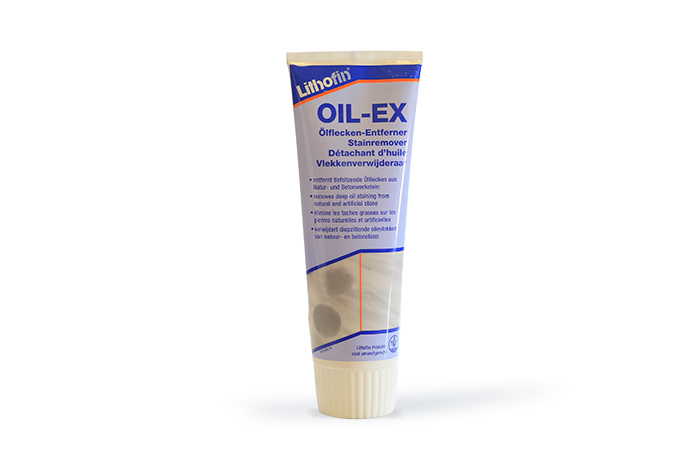
Lithofin OIL-EX is a ready-to-use, gel-like paste that we recommend for spot-cleaning oil- and grease-based stains, including those that are deeply ingrained. Consisting of a mixture of solvents and highly absorbent solids, the paste consistency allows the active ingredients to work on the substrate for a long time. It dries to a powder that can then be brushed off.
We recommend it for natural stone, porcelain and composite decking and it is ideal for garage entrances, driveways and kitchen worktops.
Coverage: Spot clean
Method: Direct
Removing epoxy grout and glue from paving
Lithofin Resin-Ex
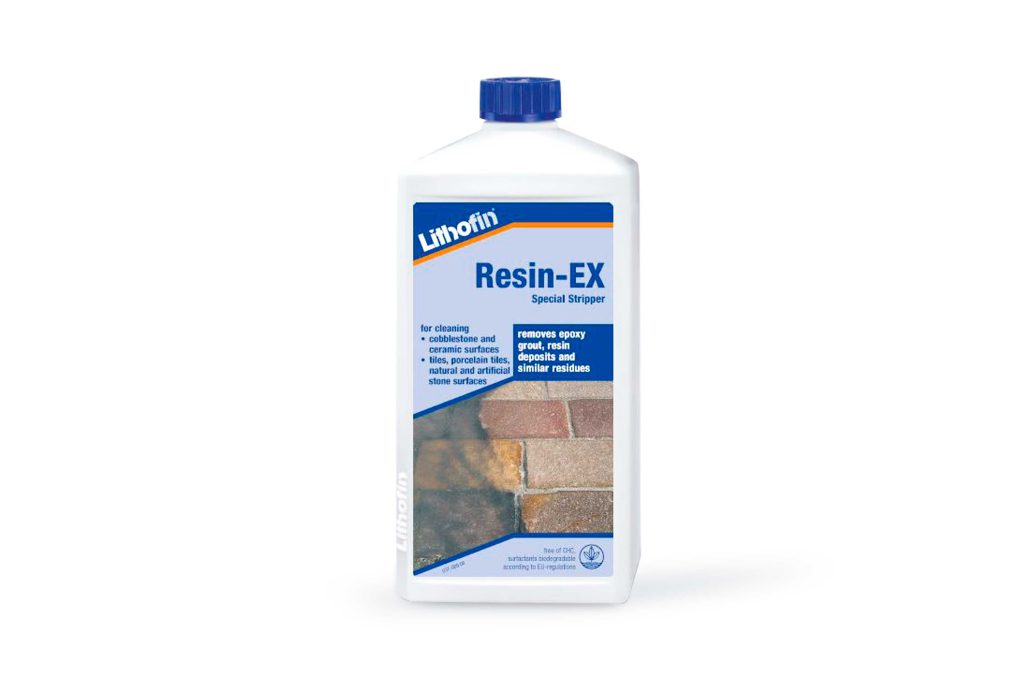
We recommend this for removing resin, epoxy grout and glue, which may be spilt when laying porcelain tiles. This special formulation is based on acidic reaction compounds supported by select, highly active organic solvents. This allows Resin-Ex to penetrate many substances - including sealants, paint, lacquer and plastic residues - and dissolve them from the surface.
As it’s a gel, it’s simple to apply and, in many cases, can be used instead of (dangerous and environmentally harmful) CFC-based cleaning products.
Coverage: 5m2 or 20m2 per litre depending on application
Method: Direct
PLEASE NOTE: Lithofin Resin-Ex should never be used on limestone and other calcareous materials.
Removing efflorescence from paving
Dry Treat Acidic Cleaner
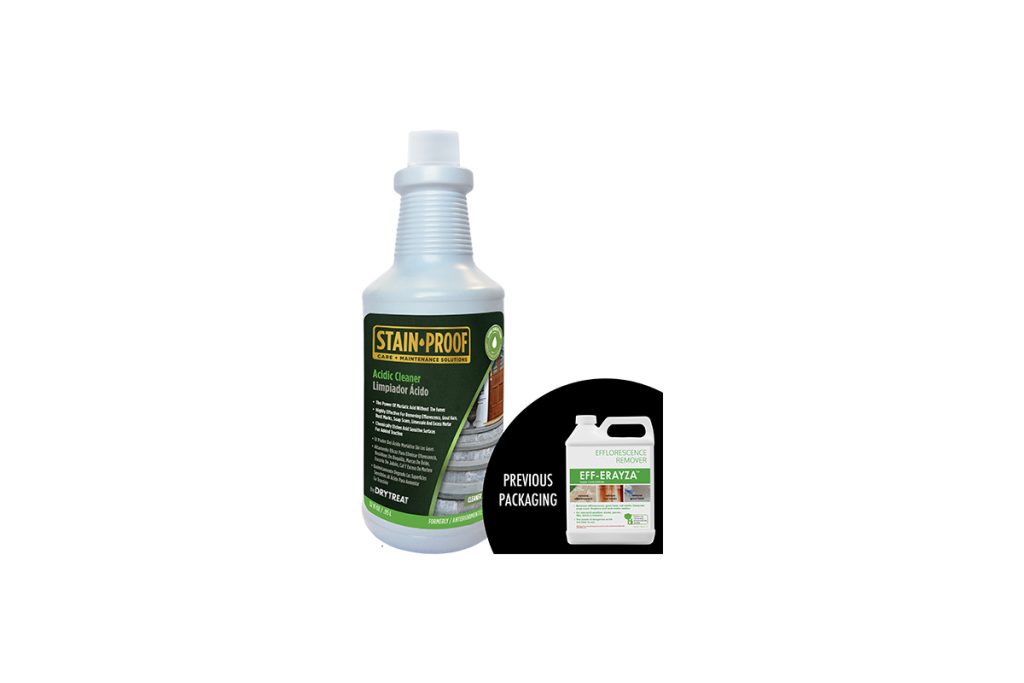
Dry Treat Acidic Cleaner, formerly known as Hanafinn Eff-Erayza, is our recommendation for removing efflorescence. It also works on rust stains, timber tannings, grout haze and mortar stains. It's worth noting that Dry Treat Acidic Cleaner has a gentler acid content than our other cleaners and brief contact does not burn the skin. You will need to purchase Dry Treat Alkaline Cleaner as well, in order to neutralise the acid before rinsing off.
PLEASE NOTE: Dry Treat Acidic Cleaner should never be used on limestone or other calcareous materials.
Indoor surfaces and outdoor kitchen surfaces
Dry Treat Daily Countertop Cleaner
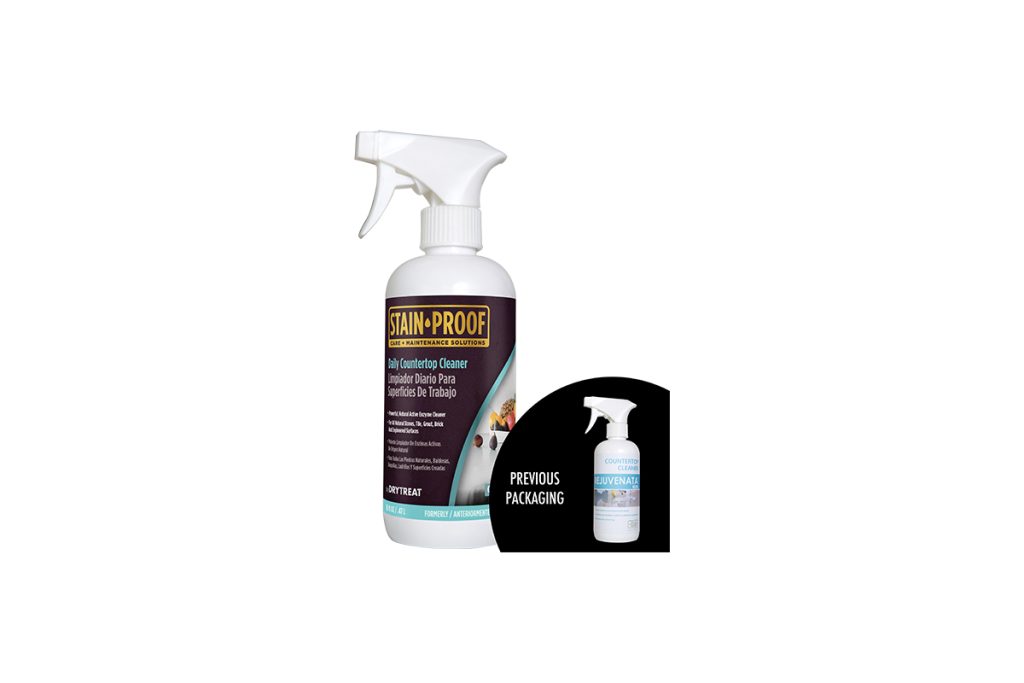
With the increasing popularity of using natural stone and porcelain to unite indoor and outdoor spaces, we've found Dry Treat Daily Countertop Cleaner, previously known as Hanafinn Rejuvenator Spray, formulated for daily cleaning of natural stone and porcelain worktops. With a low VOC formula, it makes surfaces increasingly stain-resistant when used over time.
This would also be our recommendation for outdoor kitchen surfaces.
Reducing the need to clean
It's worth bearing in mind that sealing considerably reduces the attention that paving requires, especially if it's sawn paving. Unsealed stone absorbs stains more readily, whereas sealed stone repels them so that they lie more on the surface, making them easier to remove. Find out more in our guide to pre-sealing and sealing.
Cleaning limestone
The good news is that limestone, being generally dense, seldom needs cleaning, but what can you do if it does? A common problem is the misuse of acid cleaners. This has a detrimental and irreversible effect on the look of limestone paving. Always choose a cleaner that specifies that it is suitable for limestone. Find out more in our information on cleaning black limestone.
Need advice?
At times it may be necessary to use multiple paving cleaning products in different orders. For example, SMC to remove general dirt and reveal black spot and rust, a stain remover for the black spot and a specific cleaner for the rust.
If you're at all unsure about how to clean your patio, we recommend talking to experts. Here at London Stone we're happy to offer advice how to use any of our products. And on how to approach any particular stains. Just pick up the phone. Or why not visit one of our showrooms? (We'll give you a coffee, too!)
Post updated: March 2024


/filters:quality(40)/mediadev/media/homepage/price_right_arrow.svg)
/filters:quality(60)/mediadev/media/menu-pics/menu_banner_mobile.png )
/filters:quality(60)/mediadev/media/menu-pics/all-porcelain.jpg )
/filters:quality(60)/mediadev/media/menu-pics/luxury-italian.jpg )
/filters:quality(60)/mediadev/media/menu-pics/premium-italian.jpg )
/filters:quality(60)/mediadev/media/menu-pics/budget-porcelain.jpg )
/filters:quality(60)/mediadev/media/menu-pics/large-format-porcelain.jpg )
/filters:quality(60)/mediadev/media/menu-pics/wood-effect-porcelain.jpg )
/filters:quality(60)/mediadev/media/menu-pics/porcelain-planks.jpg )
/filters:quality(60)/mediadev/media/menu-pics/porcelain-setts.jpg )
/filters:quality(60)/mediadev/media/menu-pics/browse-all-paving.jpg )
/filters:quality(60)/mediadev/media/menu-pics/stone-paving.jpg )
/filters:quality(60)/mediadev/media/menu-pics/interior-tiles.jpg )
/filters:quality(60)/mediadev/media/menu-pics/stone-effect-porcelain.png )
/filters:quality(60)/mediadev/media/menu-pics/wood-effect-porcelain.png )
/filters:quality(60)/mediadev/media/menu-pics/grey-porcelain.png )
/filters:quality(60)/mediadev/media/menu-pics/beige-porcelain.png )
/filters:quality(60)/mediadev/media/menu-pics/dark-porcelain.png )
/filters:quality(60)/mediadev/media/menu-pics/light-porcelain.png )
/filters:quality(60)/mediadev/media/menu-pics/patio-grout.jpg)
/filters:quality(60)/mediadev/media/menu-pics/primers.jpg)
/filters:quality(60)/mediadev/media/menu-pics/porcelain-blades.jpg)
/filters:quality(90)/mediadev/media/menu-pics/drainage.jpg)
/filters:quality(60)/mediadev/media/menu-pics/cleaners.jpg)
/filters:quality(60)/mediadev/media/menu-pics/all-stone-paving.jpg )
/filters:quality(60)/mediadev/media/menu-pics/all-sawn-paving.jpg )
/filters:quality(60)/mediadev/media/menu-pics/all-riven-paving.jpg )
/filters:quality(60)/mediadev/media/menu-pics/indian-sandstone.jpg )
/filters:quality(60)/mediadev/media/menu-pics/limestone-paving.jpg )
/filters:quality(60)/mediadev/media/menu-pics/granite-paving.jpg )
/filters:quality(60)/mediadev/media/menu-pics/slate-paving.jpg )
/filters:quality(60)/mediadev/media/menu-pics/yorkstone-paving.jpg )
/filters:quality(60)/mediadev/media/menu-pics/stone-pavers.jpg )
/filters:quality(60)/mediadev/media/menu-pics/cobbles-setts.jpg )
/filters:quality(60)/mediadev/media/menu-pics/plank-paving.jpg )
/filters:quality(60)/mediadev/media/menu-pics/paving-circles.jpg )
/filters:quality(60)/mediadev/media/menu-pics/bespoke-paving-1.jpg )
/filters:quality(60)/mediadev/media/menu-pics/edging-stones-1.jpg )
/filters:quality(60)/mediadev/media/menu-pics/prestige-stone.jpg )
/filters:quality(60)/mediadev/media/menu-pics/grey-blue-stone.png)
/filters:quality(60)/mediadev/media/menu-pics/swatch-black-dark.jpg )
/filters:quality(60)/mediadev/media/menu-pics/swatch-buff-beige-white.jpg )
/filters:quality(60)/mediadev/media/menu-pics/sealants.jpg)
/filters:quality(60)/mediadev/media/menu-pics/all-clay-paving.jpg )
/filters:quality(60)/mediadev/media/menu-pics/alpha-clay-pavers.jpg )
/filters:quality(60)/mediadev/media/menu-pics/cottage-garden-clay-pavers.jpg )
/filters:quality(60)/mediadev/media/menu-pics/kessel-garden-clay-pavers.jpg )
/filters:quality(60)/mediadev/media/menu-pics/artisan-clay-pavers.jpg )
/filters:quality(60)/mediadev/media/menu-pics/grey-blue-clay-paver.png )
/filters:quality(60)/mediadev/media/menu-pics/red-brown-clay-pavers.png )
/filters:quality(60)/mediadev/media/menu-pics/beige-buff-clay-pavers.png )
/filters:quality(60)/mediadev/media/menu-pics/composite-decking.jpg )
/filters:quality(60)/mediadev/media/menu-pics/designboard-decking.jpg )
/filters:quality(60)/mediadev/media/menu-pics/classic-designboard.jpg )
/filters:quality(60)/mediadev/media/menu-pics/brushed-designboard.jpg )
/filters:quality(60)/mediadev/media/menu-pics/grooved-designboard.jpg )
/filters:quality(60)/mediadev/media/menu-pics/millboard-decking.jpg )
/filters:quality(60)/mediadev/media/menu-pics/grey-decking.jpg )
/filters:quality(60)/mediadev/media/menu-pics/black-charcoal-decking.jpg)
/filters:quality(60)/mediadev/media/menu-pics/brown-decking.jpg)
/filters:quality(60)/mediadev/media/menu-pics/all-build-deck.png )
/filters:quality(60)/mediadev/media/menu-pics/stone-cladding.jpg )
/filters:quality(60)/mediadev/media/menu-pics/all-garden-walling-1.jpg )
/filters:quality(60)/mediadev/media/menu-pics/facing-bricks.jpg )
/filters:quality(60)/mediadev/media/menu-pics/garden-screening.jpg )
/filters:quality(60)/mediadev/media/menu-pics/menu_Garden_banner_desk.png )
/filters:quality(60)/mediadev/media/menu-pics/all-steps-coping.jpg )
/filters:quality(60)/mediadev/media/menu-pics/stone-garden-steps.jpg )
/filters:quality(60)/mediadev/media/menu-pics/sawn-steps.jpg )
/filters:quality(60)/mediadev/media/menu-pics/riven-steps.jpg )
/filters:quality(60)/mediadev/media/menu-pics/yorkstone-steps.jpg )
/filters:quality(60)/mediadev/media/menu-pics/bespoke-steps.jpg )
/filters:quality(60)/mediadev/media/menu-pics/porcelain-steps.jpg )
/filters:quality(60)/mediadev/media/menu-pics/off-the-shelf.jpg )
/filters:quality(60)/mediadev/media/menu-pics/stone-coping.jpg )
/filters:quality(60)/mediadev/media/menu-pics/sawn-coping.jpg )
/filters:quality(60)/mediadev/media/menu-pics/riven-coping.jpg )
/filters:quality(60)/mediadev/media/menu-pics/yorkstone-coping.jpg )
/filters:quality(60)/mediadev/media/menu-pics/bespoke-coping.jpg )
/filters:quality(60)/mediadev/media/menu-pics/stone-pier-caps.jpg )
/filters:quality(60)/mediadev/media/menu-pics/porcelain-coping.jpg )
/filters:quality(60)/mediadev/media/menu-pics/all-bespoke-services.jpg )
/filters:quality(60)/mediadev/media/menu-pics/bespoke-paving-2.jpg )
/filters:quality(60)/mediadev/media/menu-pics/bespoke-steps-1.jpg )
/filters:quality(60)/mediadev/media/menu-pics/bespoke-coping-1.jpg )
/filters:quality(60)/mediadev/media/menu-pics/edge-profiles.jpg )
/filters:quality(60)/mediadev/media/menu-pics/masonry-services.jpg )
/filters:quality(60)/mediadev/media/menu-pics/deluxe-pergolas.jpg )
/filters:quality(60)/mediadev/media/menu-pics/proteus-pergolas.jpg )
/filters:quality(60)/mediadev/media/menu-pics/corten_planter_menu.png )
 Trade Discount Available
Trade Discount Available FREE Nationwide Delivery
FREE Nationwide Delivery Nationwide Showrooms
Nationwide Showrooms Live Stock Levels
Live Stock Levels Split Packs Available
Split Packs Available